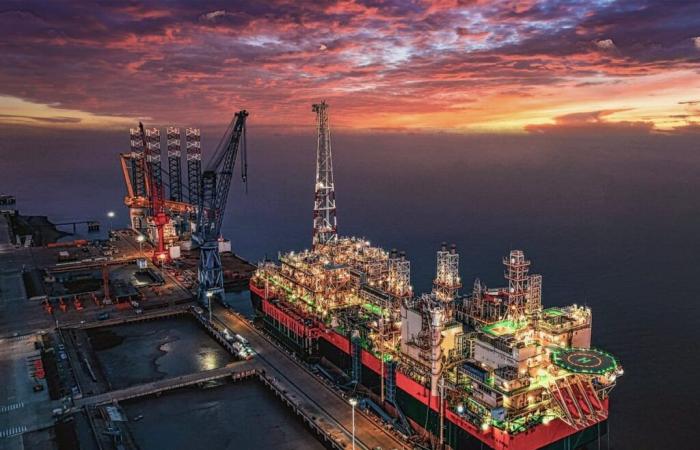The first cubic meters of gas from the Grand Tortue Ahmeyim (GTA) field, co-exploited by Mauritania and Senegal, are expected at the beginning of 2025. But before this start, indiscretions report enormous over-invoicing on the part of the British giant British Petroleum ( BP) in charge of carrying out this offshore project. Several billion dollars are at stake.
Unless there is yet another postponement, the first cubic meters of gas should come out of the wells of the Grand Tortue Ahmeyim gas field, off the Senegalese-Mauritanian coasts and at a depth of more than 2,750 meters. This important deposit, whose reserves are estimated at 450 billion m3 of gas, arouses as much hope in Mauritania as in Senegal, which have decided, by mutual agreement, to share the resource. The project is operated by the British BP which holds 60%, the American Kosmos Energy (30%), as well as the Senegalese national companies Petrosen and Mauritanian SMH for 5% each.
However, it is no longer just the start date of the project that is raising questions among the Mauritanian and Senegalese authorities after numerous postponements. It is also and above all the oil costs of this project put forward by BP which are at the origin of legitimate suspicions on the part of the two countries. These costs are divided between research expenses, development investments, operating expenses, provisions made as a result of the work, etc.
The main costs of the project are: the construction of a breakwater on the high seas which houses the liquefaction plant for which an EPC type contract of 350 million dollars was awarded to the Franco-Italian consortium Eiffage-Saipan, the marine engineering for gas extraction for 750 million dollars in EPCI mode contract, the floating production, storage and development vessel (FPSO) for an amount of approximately one billion dollars won by TechnipFMP in EPCIC mode contract which goes from construction to operationalization, and, finally, the floating gas liquefaction plant (FLNG) worth 1.3 billion dollars in rental and operation contract mode for a period of 20 years old.
In total, the costs of the four contracts were around $3.5 billion at the time they were signed. However, these amounts were significantly increased between the date of their signature and that of delivery, due to numerous factors including the effects of Covid-19. Also put forward is the extension of the duration of construction of these infrastructures due to delays in the execution of the project which was to start in 2022, the bankruptcy of the American multinational Mc Dermott specializing in technical engineering and partner of BP and which was in charge of the construction of the project’s underwater infrastructure would also explain this increase in final costs.
As a result, the initial investment estimated in 2018 at $5 billion would have doubled to more than $10 billion. Already in 2020, Hassana Mbeirick, specialist in international trade negotiations and former director of SNC-Lavalin Mauritania, argued in the columns of Financial Afrik that “BP is today almost already at 10 billion investments”. Since then, delays have piled up and expenses have continued to mount.
Smart who, today, would advance the overall oil cost that BP will announce for the first phase of the project which should allow the platform to produce 2.5 million tonnes of liquefied natural gas (LNG) per year which will be exported via LNG carriers and the terminal built 10 km from the coast.
The higher these costs are, the higher the amount BP will recover. And for the recovery of oil costs, BP, within the framework of the production sharing contract, will be able to retain each year a portion of the total production defined by the contracting parties
A situation which explains that even before the start of the project, Mauritania and Senegal clearly indicated to BP that they do not agree on the costs put forward, judging them to be overestimated compared to those initially announced. Suspecting BP of having overinvoiced the costs of the GTA project, the Mauritanian and Senegalese governments requested, in January 2024, audits to better understand the reality of the charges incurred by the British oil company.
Thus, at the start of the year, after meetings between heads of state and ministers concerned, the two countries initiated, each on their own, an audit of the costs of the project. Mauritania opted for the expertise of a Tunisian firm, Samir Labidi, the former Senegalese regime chose the French Mazars.
First to submit its copy, the Tunisian accounting firm Samir Labidi, is a specialist in oil costs and has numerous experts. According to the results of this expertise unveiled by Africa Intelligent, the Tunisian cabinet issued, in its report submitted to the Mauritanian Minister of Oil, reservations on several hundred million dollars of expenses claimed by BP on block 8, in the Mauritanian part of the GTA deposit. Therefore, “the cabinet therefore proposes to the Mauritanian State to refuse these costs as long as the operator has not communicated sufficient convincing elements to justify them”, according to the indiscretions obtained by Africa Intelligence.
After the results of the audit commissioned by Mauritania, that of Senegal confirms the overinvoicing of oil costs by BP, at the head of the consortium which exploits the Grand Tortue Ahmeyim offshore deposit, straddling the waters of the two countries.
Also according to Africa Intelligence, BP estimated its “recoverable costs” at $4.1 billion. However, according to the Mazars report that Africa Intelligence claims to have consulted, the expenses mentioned by BP, i.e. $2.8 billion, correspond to “documented costs not recoverable with regard to contractual rules”, and to “insufficiently justified or documented” for approximately $1.8 billion. Among the expenses that arouse suspicion, $1.5 billion is caused by a “change in contractual terms” that BP attributes to the impact of Covid-19, “additional taxes” and the “foreign exchange effect. »
According to Mazars, cited by Africa Intelligence, only a quarter of this sum actually falls into the category of oil costs to be recovered. Hence a huge gap between the amount of recoverable costs announced by BP. The latter must prove these costs, their compliance with procedures and provide proof that they are duly justified. The grievances relate to the process of selecting subcontractors, the awarding of certain calls for tenders, missions granted to entities linked to BP without a call for tenders, the evaluation of the teams’ working time of BP,… So many factors which contribute to fueling suspicions as to the veracity of the costs put forward by the British oil company.
Clearly, according to the two firms, the costs put forward by BP are greatly overestimated. And these recoverable costs will be taken from the backs of Mauritania and Senegal. Faced with this situation, the two countries contest the oil costs put forward by BP and feel cheated by this inflation of costs which will reduce the future income that they will garner during the first years of operation, intend to act together to obtain a gain in cause and therefore a clear downward revision of the oil costs put forward by BP.
As a result, the increase in costs having an impact on profits, this means that this over-invoicing will have an impact on the tax revenue generated by the project. This means that the inflation of oil costs by BP represents a threat to the public gas revenues of both countries.
Beyond the costs, the two countries want a “global renegotiation”. It should be noted that the new Senegalese authorities had made the review of oil, gas, mining contracts, etc., signed with foreign multinationals, a priority.
And for good reason, BP is also singled out for non-respect of local content in the context of carrying out the project.
So many grievances mean that relations between stakeholders risk becoming strained between now and the start of operations and during the first years of operation.
One thing is certain, the two countries will not be able to spend these huge amounts at a loss. If it is difficult to revise the contract with BP because of the stabilization clauses which allow multinationals to protect themselves from political risks and thus shelter themselves from economic and legislative changes, it is not the same to overcharging. BP must prove otherwise, otherwise it will be forced to review these accounts.
The audits of independent firms in the hands of Mauritania and Senegal can at least force the British oil company to review its calculations, especially since the complaints made by the audit firms are numerous and documented.
Faced with this situation, the new Senegalese regime has already set up a commission of senior officials to work on the issue. The deposit being exploited by the two countries, Mauritania and Senegal intend to join forces against BP.
In this regard, it should be noted that the Mauritanian Minister of Economy and Finance, Sid’Ahmed ould Bouh, held discussions on Thursday December 5, 2024 in London with David Campbell, vice-president of the BP company and responsible regional for Mauritania and Senegal. Without giving details, the Mauritanian ministry claims that the discussions focused on the final preparations for the imminent exploitation of natural gas from GTA scheduled for early 2025… If the eyes of the different parties are fixed on the start of exploitation , this problem of overbilling risks further straining relations between the different project partners.
Moussa Diop
Afrique.le360.ma






